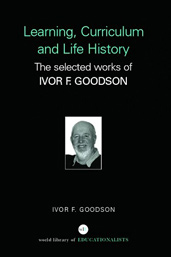Learning, Curriculum and Life Politics: the selected works of Ivor F. Goodson
Towards an Alternative Pedagogy
Acknowledgement of the crucial role of each individual pupil's interests and experience in the learning process is only a starting point for exploring a possible new pedagogy. Certainly such acknowledgement could be, and often is, used in amplifying transmission method pedagogies. 'This regard for children's interests in teaching has more relevance to the method of teaching than to its content... Children's existing interests can be used as a starting point from which they can be led on to take an interest in realms of whose existence they never dreamt'(Peters and Hirst 1970, pp. 37-38). By this argument the child's interest can be used as a method but has little relevance to content: the teacher defines the content and uses the child's interest to transmit it to him. Acknowledgement of the importance of the child's experience and interests and acceptance of these as valid knowledge content in classroom learning can lead to two distinctive alternative pedagogies. The first pedagogy, child-centred progressivism, would centre on the child's interest, and in doing so conclude that the pedagogy should aim to allow him to personally direct his own learning. W.H. Kilpatrick's views are closest to advocating this pedagogy; for him education starts where the child is so as to capitalize on the child's personally directed activity springing from his real interest.
It is what pupils do of themselves that brings the best learning results, both in direct learning and in concomitant learnings. We can thus say, paradoxically, that the teacher's aim is to give as little help as possible, that is, to give the least degree of direct help consistent with the best personal work on the part of the pupils (Kilpatrick 1951, p. 307).
A similar style of pedagogy is described by Charity James:
... at its most elementary, if a group of students is engaged on Interdisciplinary Enquiry, within the area of investigation (say, some aspect of life in a technological society, or of human growth and development in childhood and adolescence) students formulate the questions they want to answer, identify the problems which they want to solve, create hypotheses for their solutions, test them and revise the hypotheses (James 1968, pp. 65-66).
For James, as for Kilpatrick, the teacher is seen 'as a consultant to students in their self-directed enterprise' (James 1968, pp. 65).
Whilst sympathetic to the emphasis of Kilpatrick and James, I think the pedagogy they recommend is over-dependent (one might say solely dependent) on 'what pupils do themselves' (Kilpatrick 1951, p. 307). Such an emphasis seems to be ill suited to the interactive character of classroom learning in two ways:
(a) A major part of the rationale for classroom learning must surely turn on those aspects the pupil learns in interaction with his peers and his teacher. This interactive dimension in learning can aid the development of the pupil's interests and ideas into other areas from those he might independently explore. Learning associated with the kind of pedagogy Kilpatrick and James advocate seems to miss most of the potential present in classroom interaction.
(b) A further aspect of classroom interaction is that the pupil's independent studies may well be subject to a good deal of interruption. The Kilpatrick model never seems to come to grips with the question of 'control' within the classroom. Any pedagogy that fails to address this question is surely doomed. This is not because the class-room teacher is an irremediable authoritarian by nature but because part of his/her job must be to ensure that pupil's work can go on uninterrupted. This means that he must be more than a consultant in his classroom. A viable pedagogy must acknowledge that in the classroom 'the crowds remain' to pull at the student's attention and divert the teacher's energy (Jackson 1968, p. 111).
A second pedagogy based on the child's individual interests and experiences addresses itself to the interactive potential and reality of the classroom. Acknowledgement of the paramount role of individual process is self-sufficient. The paramountcy of individual process in learning does not preclude the role of external challenge and collaboration in that process; rather, it argues for such a role to be at the centre of the teacher's actions.
